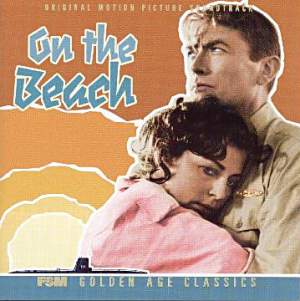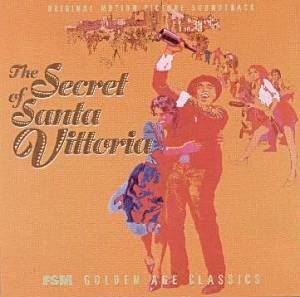************************************************************** EDITOR’s CHOICE August 2002 **************************************************************
Ernest GOLD
(1) On the Beach. (2) The Secret of Santa Vittoria
OSTs
FILM SCORE MONTHLY Vol. 5 No. 7 [77:54]
Available from Film Score Monthly, 8503 Washington Boulevard, Culver City, CA90232; Tel: 1-888-345-6335; overseas: 310-253-9595; fax: 310-253-9588;
Email: Info@filmscoremonthly.com
The scores for both On the Beach (1959) and The Secret of Santa Vittoria (1969) earned best score Academy Award nominations for Ernest Gold. Both films were released by United Artists and both were directed by Stanley Kramer.
On the Beach starred Gregory Peck, Ava Gardner and Anthony Perkins, all cast against type and Fred Astaire in a late career cameo role as a disillusioned pioneer atomic scientist. The film was set in Australia in the aftermath of an apocalyptic atomic war with its people awaiting death and annihilation as a radio-active cloud approaches the Antipodes. Kramer insisted on using the Australian national song, 'Waltzing Matilda' much to the disappointment of Gold but he rose to the occasion and wrought a magnificent score around this refrain. In Gold's hands Waltzing Matilda becomes (I quote here from Jeff Bond and Lukas Kendall's excellent notes) "not just a predictable marker for Australia but a playful romantic tune for Moira, both an anthem and a dirge for humanity, and the voice of the small daily traditions that the film's characters turn to and embrace in order to deal with the prospect of their imminent demise." Straightaway for the Main Title Waltzing Matilda is a majestic trumpet statement, then a warm pastoral string. But in addition there is a beautiful theme for 'Peter and Mary', tender cosy and blissful as Peter (Perkins) makes tea for his still-sleeping wife Mary (Donna Anderson) and a bottle for their baby daughter. This haunting theme is tinged with foreboding as Peter glances at the calendar on the wall, a countdown to doomsday. But the outstanding tracks on this album are 'The Desolate City' and 'The Mysterious Signal' that are in complete contrast to the more lyrical domestic bliss and romance between Dwight Towers (Peck) and Moira Davidson (Gardner). The Desolate City is music for an annihilated San Francisco that Peck and his submarine crew find when they vainly respond to what they believe is a radio signal in the belief that there has been a reprieve for mankind. Gold imaginatively and very effectively underscores this devastating scene to chilly effect. He uses "a questing twelve-tone row for French horns with bombastic accompaniment [as the sub enters] through the Golden Gate and sounds furiously as Towers looks through his periscope at the lifeless city… The twelve-tone theme becomes a pointillistic whisper over string harmonics as [one of the crewmen] swims away from the sub preferring to die in his home city." The dejected music for 'The Mysterious Signal' underscores the scene in which the signal that had raised such hopes turns out to be nothing more than a radio room window shade tugging on an empty coke bottle. Here "mysterious scoring for atonal strings, the clarinet pulse and trilling bass clarinet for the industrial landscape gives way to Herrmmanesque suspense for the radio room.
In contrast The Secret of Santa Vittoria had no message and was more light-hearted. It was set in an Italian village famed for its wine production. Threatened with German occupation the inhabitants find a novel way of hiding thousands of their precious bottles. The film starred Anthony Quinn in something of a Zorba the Italian role supported by Anna Magnani as his somewhat shrewish wife and Vira Lisi as the voluptuous Countess Caterina Malatesta. Gold's score is remembered mainly for its 'The Song of Sanat Vittoria (Stay)' a glorious romantic song in the grand Italian tradition used for the love story between Bombolini's (Quinn) daughter, Angela (Patrizia Valturri)and the young student Fabio (Giancarlo Giannini). It is first heard on the mandolin in the main title music and then sung in the initial track by Sergio Franchi an accomplished tenor who coincidentally appears as the Italian soldier Tufa in the film. This extremely enjoyable and colourful score has many highlights. These include: Italianesque folk song material (like 'Con lo Zigo Zigo Zza' ) scored for the oompah-oompah type of band so familiar in small Italian towns; the hesitant and honeyed melancholic 'Blood and tears' for the love affair between Tufa and the Countess; and the comic stealthy, lightly ironic 'Hiding the Wine' underscoring the human chain that passes thousands of wine bottles from the town to their hiding place outside the town; the very catchy march that is 'Via Bombolini'. All these and the more menacing figures for the German invaders.
Another winner from Film Score Monthly. Unhesitatingly recommended.
Ian Lace

Return to Index

